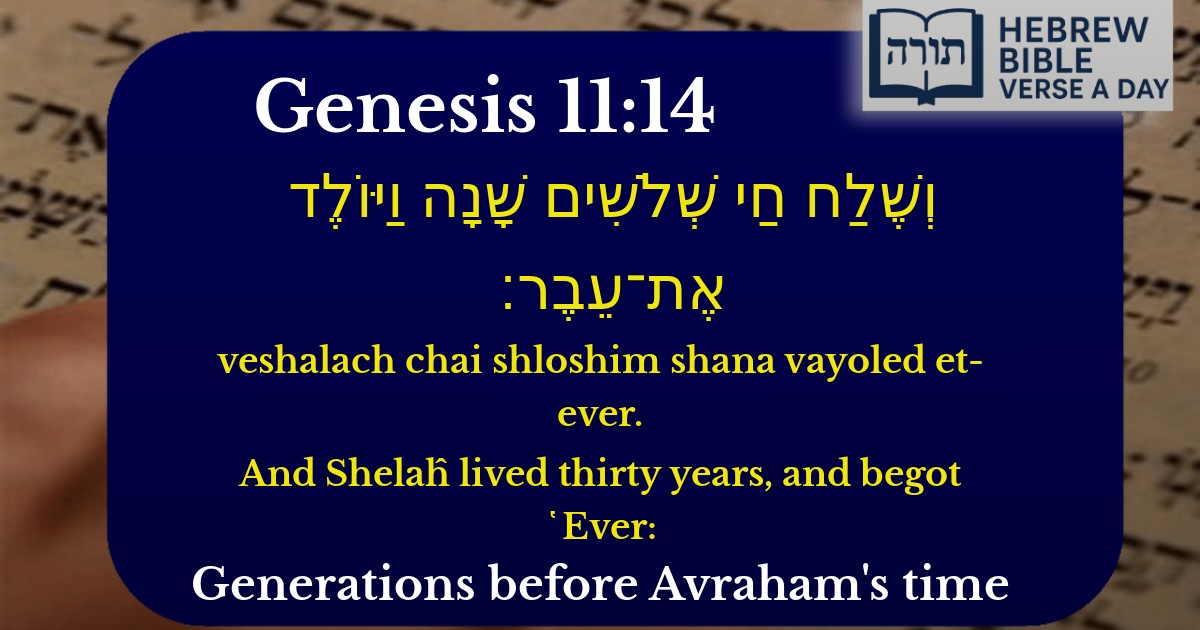Frequently Asked Questions
Q: Who was Shelaḥ in Genesis 11:14?
A: Shelaḥ (שֵׁלַח) was a descendant of Noah through his son Shem. According to the Torah (Genesis 11:10-17), he was the father of �Ever (עֵבֶר), who was an ancestor of Avraham Avinu. The Sages teach that ῾Ever was a righteous man and a prophet, and some say the Hebrew language (Ivrit) is named after him.
Q: Why does the Torah mention Shelaḥ living 30 years before having ῾Ever?
A: The Torah often lists ages when fathers had children to establish clear genealogies. Rashi explains that these details show the orderly transmission of tradition from generation to generation. The number 30 may also symbolize maturity, as the age of 30 is when a person reaches full strength (Pirkei Avot 5:21).
Q: What is the significance of ῾Ever (עֵבֶר) in this verse?
A: ῾Ever (עֵבֶר) is significant because he was a key link in the chain leading to Avraham Avinu. The Midrash (Bereishit Rabbah) states that ῾Ever maintained the traditions of Shem and taught Torah in his yeshiva (academy). Some say Yaakov Avinu studied there. His name is also connected to the term 'Ivri' (Hebrew), referring to Avraham and the Jewish people.
Q: How does this verse connect to Jewish history?
A: This verse is part of the genealogy from Noah to Avraham, showing the unbroken line of tradition. The Rambam (Hilchot Avodah Zarah 1:1) explains that Avraham rediscovered monotheism because he received teachings passed down from Shem and ῾Ever. Thus, this verse highlights the transmission of emunah (faith) through generations.
Q: Why does the Torah list so many generations in Genesis 11?
A: Listing generations teaches that every individual in the chain had a purpose. The Sforno explains that these genealogies show Divine Providence guiding history toward Avraham, the father of the Jewish people. The Talmud (Sanhedrin 69b) also derives lessons from these lifespans, showing how generations changed after the Flood.


Context in the Genealogy
The verse (Genesis 11:14) appears in the genealogy from Shem to Avraham, listing the descendants of Noach. Shelaḥ is the son of Arpachshad and the father of ῾Ever (Eber), linking the lineage that ultimately leads to Avraham Avinu. The Torah emphasizes precise ages at the time of fatherhood, underscoring the continuity of the generations.
Rashi's Commentary
Rashi notes that the phrase "וַיּוֹלֶד אֶת־עֵבֶר" ("and begot ῾Ever") is significant because �Ever is the namesake of the Ivrim (Hebrews), the ancestors of the Jewish people. Rashi connects this to Avraham, who is later called "Avraham Ha-Ivri" (Abraham the Hebrew), linking the name to the legacy of monotheism and the covenant.
Significance of the Name ῾Ever
The name ῾Ever (עֵבֶר) is derived from the root ע.ב.ר, meaning "to cross over" or "to pass beyond." The Midrash (Bereishit Rabbah 42:8) explains that ῾Ever was so named because he represented a transition—he lived during the time of the Tower of Bavel and maintained the original language (Lashon HaKodesh, the Holy Tongue) and faith in Hashem, unlike those who rebelled at Bavel.
Rambam's Perspective on Genealogies
Rambam (Hilchos Avodas Kochavim 1:3) highlights that the Torah meticulously records these genealogies to establish the unbroken transmission of truth from Adam to Avraham. Shelaḥ’s role in this chain reinforces the authenticity of the Jewish tradition.
Chronological Precision
The Torah specifies that Shelaḥ was thirty years old when he fathered ῾Ever. The Talmud (Sanhedrin 69b) discusses the ages of fathers in these genealogies, noting that early generations had children at younger ages, reflecting the vigor and longevity of humanity before the gradual decline in lifespans after the Flood.